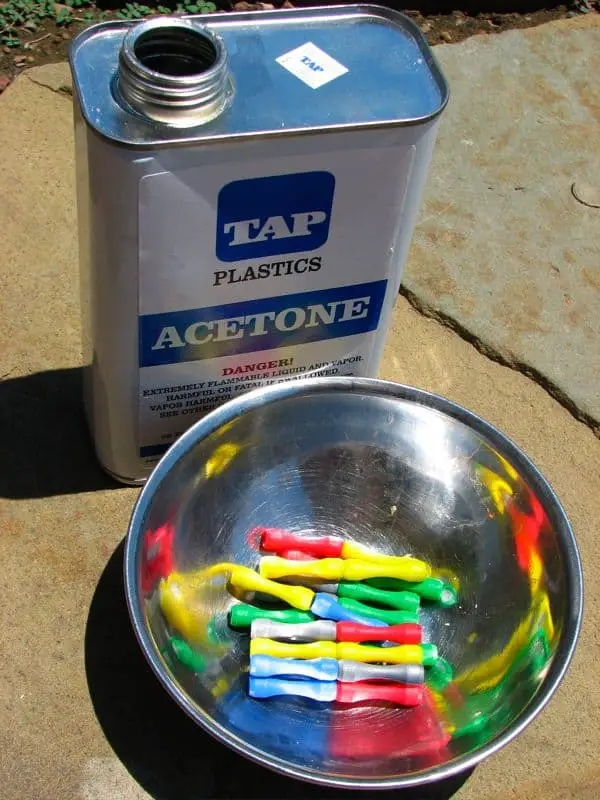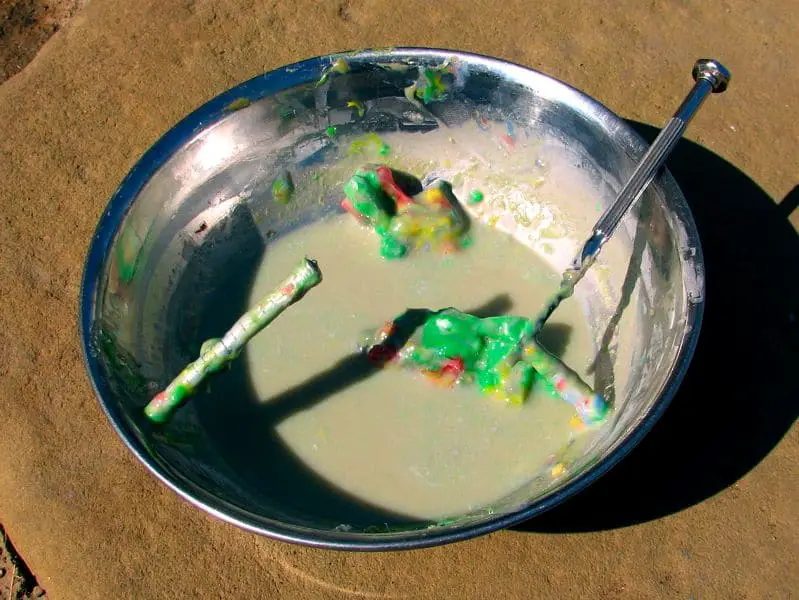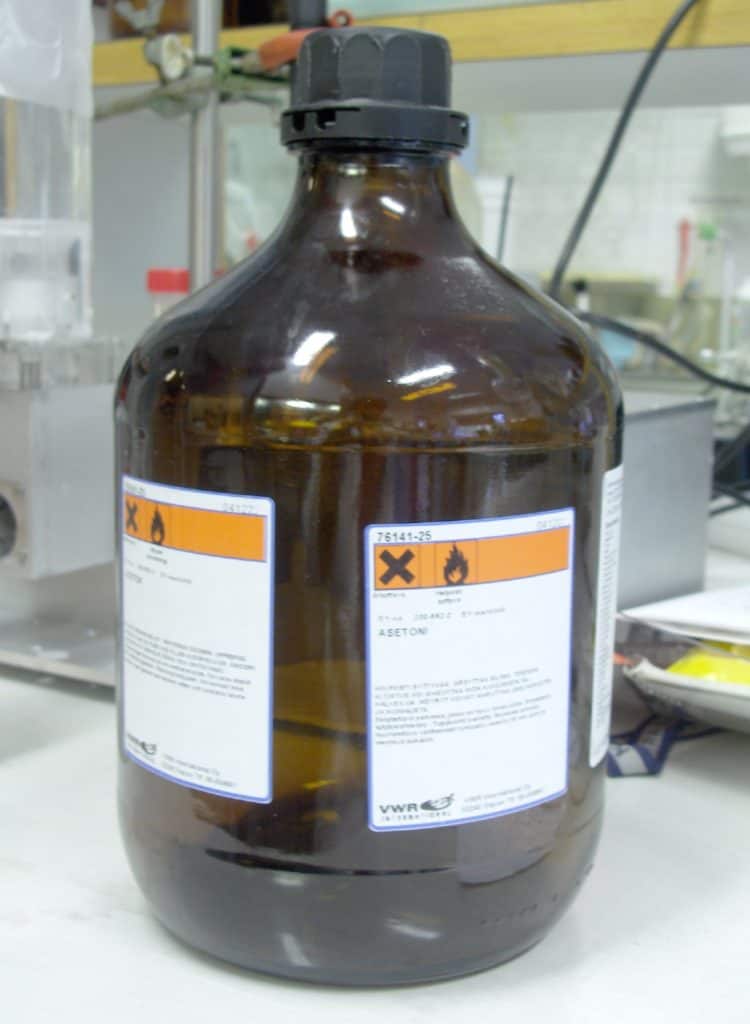When attempting to clean your electronics such as a circuit board you may wonder what you can and can’t use. Many people can easily get their hands on acetone. After all, it’s a fairly common household product.
The question is, however, is it safe to clean a circuit board with acetone? The quick answer is no. Acetone is not safe for most electronics such as circuit boards. While you may get away with it, it’s not recommended. Acetone is a strong chemical and could potentially dissolve the plastics of any Printed Circuit Board (PCB).
In a hurry? The most recommended product for cleaning circuits boards is isopropyl alcohol. Available at Amazon.com (Affiliate link)
Table of Contents
Why Acetone Is Bad For a Printed Circuit Board (PCB)

Acetone is very dangerous for a PCB. While it may be possible to clean the circuit board with acetone, it’s a risky choice. People have made the mistake of cleaning electronics with acetone and realized why it’s not a good idea while others have claimed that they’ve used acetone and it hasn’t caused any problems. That may be the case for some, and I consider them lucky for not dissolving the silkscreens and solder masks on the circuit board. — For those new to circuits, silkscreens and solder masks are the components of PCBs that protect against corrosion and electrical shorts. Remove these necessary features, and you’ve destroyed or, at least, reduced the life of your circuit board. Also, acetone is known to dissolve certain types of plastics such as ABS plastics, which many circuit boards manufactured today contain. So, unless you need to get your nails done, or have some plastics to melt, leave the acetone on the shelf.
What To Use Instead Of Acetone?

Determining what to use to clean your PCB will depend on what exactly needs to be cleaned. Either you’re just cleaning dirt/dust or something more than that such as solder flux from a recently assembled circuit board. Thankfully, there are several ways to properly clean your circuit boards, from typical maintenance (dusting) to deep cleaning (removing corrosion and grime). Here are the main tools that I use to clean my circuit boards:
Compressed Air
These magical canisters are the perfect preventative maintenance tool for computer enthusiasts that want to care for their machines. Almost any brand of compressed air works to clean circuit boards without the need to use water or solvent. Compressed Air works best to clean dust and push light grime off your circuits. However, it’s not the best if your circuit board has corrosion that needs to be treated directly. When cleaning your circuits, compressed air should be the first thing you reach for before anything else.
Water
Just basic water can be used on a lot of electronics such as circuit boards. It seems too simple to be true but it does work wonders. I’ve seen some people even claim to put their circuit board in a dishwasher with great results. However, putting your circuits inside a highly heated and pressured environment is certainly not recommended. The point is that water still works for cleaning your circuit board. Cotton swabs are great when cleaning circuits with water because you can clean the most affected spots on the circuit more precisely. You also reduce the risk of damaging the circuit.
Isopropyl Alcohol
Isopropyl alcohol (otherwise known as rubbing alcohol) seems to be the most recommended product to use on cleaning electronics. If just regular water doesn’t work then this is the next step. The other benefit of using this alcohol is that it will displace the water from the circuit board allowing it to dry a lot faster, simply because alcohol evaporates much more quickly in the open air. My favorite technique is to clean my circuits with water first, and then going back with rubbing alcohol for a deeper clean and quick drying.
A Big Caution When Cleaning a PCB
I cannot stress this enough. –Before you start cleaning any electronics you should make sure that there is no power being sent to it. This should be obvious, but it needs to be stated. On the same note, you should make sure that the circuit board is dry before you power It up. If there is any amount of moisture on the board when electricity runs through, it will fry. Then you might as well toss it out or use it as a paperweight.
How To Tell If The PCB Is Dry Enough To Use
Sometimes you might think the PCB is dry even if it’s not. There might be small amounts of moisture where you just don’t know. If there are any kinds of cracks or crevices that water might seep into, you should be cautious. To be safe, I would wait till the circuit board is completely dry from what you can see, and then give it another day or two just to be safe. You can maximize drying by placing the PCB in a well-circulated area, with plenty of air surrounding it. Also, avoid moisture and humid environments at all costs. Humid environments will help your circuit retain the moisture inside, which is not something you want.
In Conclusion, Do Not Use Acetone!

Keeping your electronics clean is super important. Of course, if you spend money on something you want to keep it nice. However, the question is always “how do I clean it?” Intuition may state that there is a miracle chemical but that’s not always the case.
For just simple things like dust and dirt, compressed air or water will do just fine. If you want to make sure you are cleaning your components correctly, YouTube and other online resources have great cleaning tutorials for specific hardware too. Just make sure there’s no power going to the circuit board when cleaning.
For a more hefty cleaning, you’ll need a stronger substance. That being said, you shouldn’t reach for the acetone, as that may be too strong and possibly dissolve the plastic on the circuit board. Instead, go for a “middle ground” such as Isopropyl rubbing alcohol. From my research, it seems to be the most recommended product and works very well. Good luck with cleaning your circuit board!
